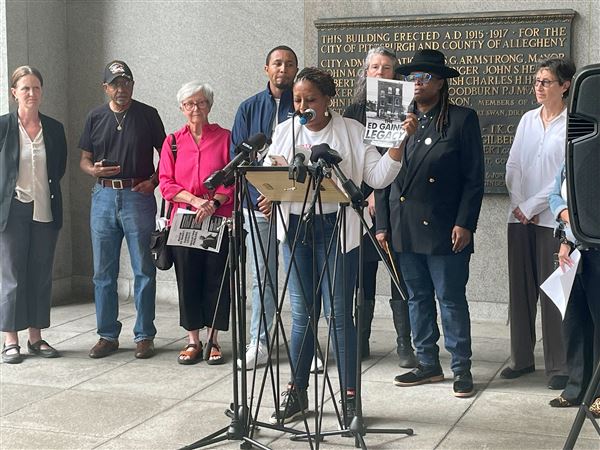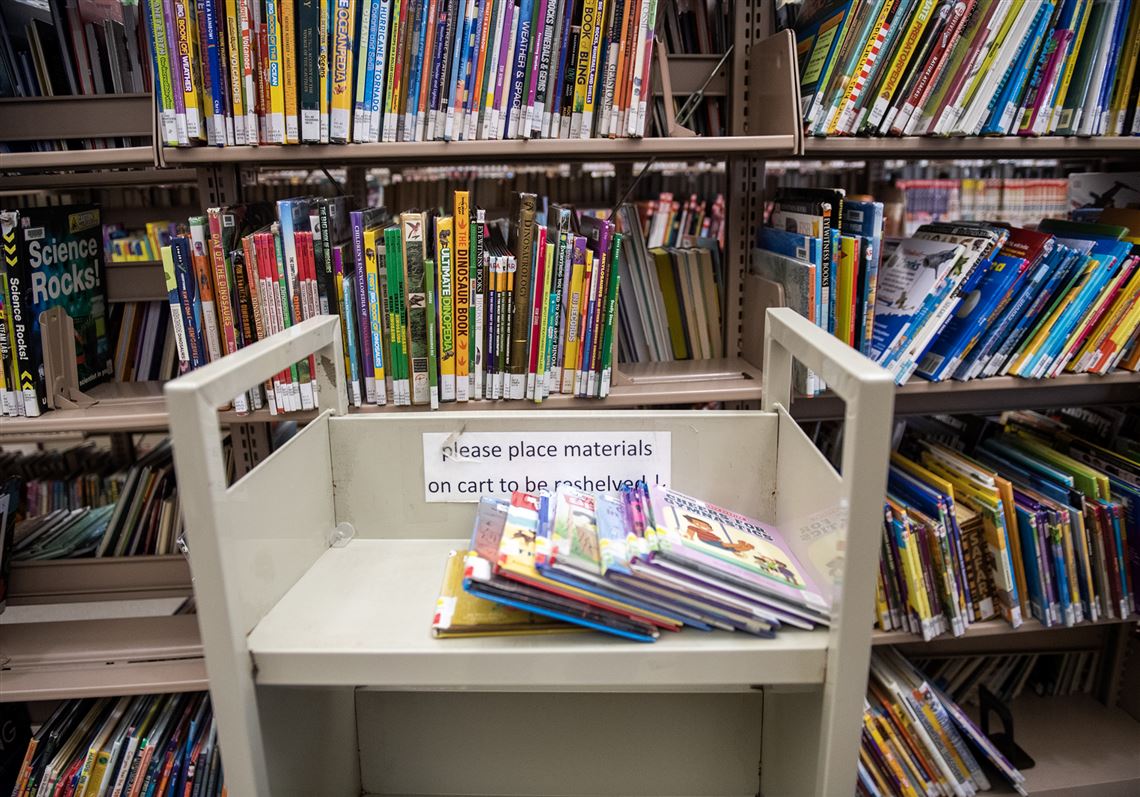Pine-Richland school directors Monday passed the final reading of a controversial library book policy, bringing to an end a contentious year-and-a-half process and potentially kick-starting major changes into which books will be offered in school libraries.
Directors in a 5-4 vote approved final changes to Policy 109.1, which lays out how library books are selected as well as the process to challenge books. Approval came despite last-ditch efforts from residents and some board members to keep the policy as it’s currently written.
“This policy, born from a vague and troubling process with unclear origins, ignores the voices of parents, students and the community,” Director Ashely Fortier said prior to the vote. “[It] disregards the knowledge and dedication of our administrators, educators and librarians, fosters distrust and risks legal and financial consequences all while failing to serve the best interests of our schools.”
The heavily edited policy — which was approved during a tense meeting that devolved into arguments between residents and at times between board members — now includes changes to the reconsideration process if a book is challenged, increases the timeline for purchasing books and adds language regarding parental rights.
Directors Philip Morrissette, Lisa Hillman, Christina Brussalis, Leslie Miller and Michael Wiethorn voted in favor of the policy’s third reading; directors Marc Casciani, Ms. Fortier, Amy Terchick and Joseph Cassidy voted against it.
Monday’s vote was the final step in a process that started in October 2023. At the time, a group of residents asked school directors to remove books from libraries they said were sexually explicit and obscene, essentially thrusting the district of 4,500 students into what has become a nationwide debate over the appropriateness of school library books.
At the time, 14 books in the middle and high school libraries were challenged, launching a review of the novels. A 10-person committee of community members and district staff was compiled, which read the books in their entirety. Following the review, Superintendent Brian Miller in April determined the books could remain in libraries.
Despite initially saying they planned to tweak language in the policy following the determination, directors over the past few months instead laid the groundwork to overhaul the policy.
Now, major changes focus on reconsideration of library materials, acquisition and opportunity for parental review.
Under the policy, if a community member asks for a book to be removed from the school library, the superintendent will review the request and the book to see if it conforms to the policy. The complainant, after being informed of a decision, will then have 21 days to appeal the determination to the board president. The board will make the final decision.
Librarians must also provide their principals with a full list of books they would like to purchase. The list will be made public for 30 days prior to the superintendent’s final approval. After 30 days, the superintendent will make a final recommendation list for approval by the school board.
And the revised policy includes a parental review section, which permits parents to direct librarians not to assign or allow their child to check out certain materials.
Proposed changes
On Monday, Ms. Terchick proposed several additional changes, including one small editorial change, which was approved by the board.
Like in previous meetings Ms. Terchick proposed changing the 30-day review process for new books down to seven.
“Thirty days is way too long,” Ms. Terchick said. “It causes problems for books getting in the hands of our kids and the vast majority of books that we are bringing forward to our kids are not anything that have issues.”
That motion met pushback from several board members including Mr. Wiethorn.
“Seven days is way too short,” Mr. Wiethorn said. “I’m comfortable with 30.”
Ms. Terchick’s motion ultimately failed, leaving the waiting period at 30 days.
But the policy had immediate effects on new library book titles that were next on the agenda following the policy vote. Because the policy passed, those titles were pushed to April to adhere to the 30-day review.
Ms. Terchick also proposed adding a line into the section “Individual Board Member Review” to state that board members be required to read books they had questions about.
Directors quickly opposed the motion, including Ms. Brussalis who said, “I think you’re adding an extra burden onto board members” who are asking for more information such as the rationale behind choosing a book.
Ms. Brussalis and Ms. Terchick often spoke over each other as they disagreed on the proposed wording.
The section, Mr. Wiethorn added, “isn’t about I want to ban the book. This is about I want information about the book. Tell me some more. Tell me something. You put it on a list you must have an understanding; help me understand.”
That motion also failed.
Following the failed motion, Ms. Fortier expressed her frustration with the policy, calling its tone “chilling.”
“We invest hundreds of thousands of dollars in trained professionals, our librarians, to curate our collections,” Ms. Fortier said. “Yet their expertise has been disregarded throughout this process. This policy invites lawsuits and fosters distrust, two things we cannot afford.”
Mr. Casciani while voting added that the policy “goes too far.”
Community reaction
Like other meetings, discussions around the policy drew many Pine-Richland residents. But this time, several people supporting the policy also showed up to speak.
Resident Cindy Vogel pointed to community standards that would create an environment “that focuses on academics and not on indoctrinating and sexualizing our teenagers.”
Others encouraged the board to “stay strong” as they work through the policy.
But many showed up to oppose the policy, some wearing T-shirts stating “Knowledge shouldn’t be censored” and holding signs opposing book bans.
“If true collaboration mattered the board would have listened to the librarians, teachers, the administrators and the community members who have repeatedly shown up here to beg you to listen,” resident Anne Meyers said. “They would have listened to their fellow board members. I’ve said it before and I’ll keep saying it: do better.”
Bri Bayer agreed, adding, “You have done nothing but sow division and discourse in this community, but yet we’re to believe you have our best interest in mind.”
Student Elise Duckworth, who has attended several school board meetings to speak out against the policy, called on the board to look at the bigger picture.
People including librarians and the community are “relying on you to make a decision that respects everyone it affects,” Elise, a 17-year-old junior, said. “It may feel as though you’re stuck on the side you’re on but everyone has a choice tonight to choose for themselves. So I urge you to ask yourself — who are you truly serving? Are you serving the best interest of this community or are you serving an agenda that overlooks the real, massive consequences of this policy?”
First Published: March 18, 2025, 2:36 a.m.
Updated: March 18, 2025, 6:35 p.m.

















